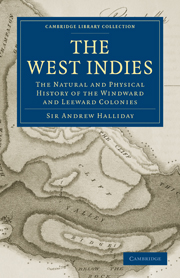Book contents
- Frontmatter
- Contents
- CHAPTER I
- CHAPTER II
- CHAPTER III
- CHAPTER IV
- CHAPTER V
- CHAPTER VI
- CHAPTER VI
- CHAPTER VII
- CHAPTER VIII
- CHAPTER IX
- CHAPTER X
- CHAPTER XI
- CHAPTER XII
- CHAPTER XIII
- CHAPTER XV
- CHAPTER XVI
- CHAPTER XVII
- CHAPTER XVIII
- CHAPTER XIX
- CHAPTER XX
- CHAPTER XXI
- CHAPTER XXII
- APPENDIX I
- APPENDIX II
- Plate section
- Frontmatter
- Contents
- CHAPTER I
- CHAPTER II
- CHAPTER III
- CHAPTER IV
- CHAPTER V
- CHAPTER VI
- CHAPTER VI
- CHAPTER VII
- CHAPTER VIII
- CHAPTER IX
- CHAPTER X
- CHAPTER XI
- CHAPTER XII
- CHAPTER XIII
- CHAPTER XV
- CHAPTER XVI
- CHAPTER XVII
- CHAPTER XVIII
- CHAPTER XIX
- CHAPTER XX
- CHAPTER XXI
- CHAPTER XXII
- APPENDIX I
- APPENDIX II
- Plate section
Summary
On Tuesday, the 24th of February, I left the River Demerara, on board the army brigantine, Duke of York. My destination was Trinidad, but as the captain had business at Tobago, we stood first for that island. We sailed from Georgetown at 4 p.m., on the 24th, and at 6 p.m., on the 27th, anchored in Scarborough Bay. Tobago is a small island of volcanic origin; the most southerly of the Windward group, and not quite so far to the east as Barbados. This island, it is said; was discovered by Columbus in 1496, which I doubt very much; for, as we know that Trinidad was not seen till two years afterwards, I cannot suppose that Columbus could visit Tobago, and not see the high mountains that were not more than eight or ten miles distant. I should rather think, that Trinidad and Tobago must have been discovered at the same time. The origin assigned to the name is also doubtful. Tobago, or Tobacco, may have been the original name of the narcotic herb now so much in repute in Europe; but why it should be so abundantly used in this little spot as to lead the Spanish commander to designate the island thereby, has nowhere been stated. When first visited, it was occupied by a tribe of natives from the main-land. These, whether from the genuine nation of the Carabeese or not, were accounted Carribs by the discoverers.
- Type
- Chapter
- Information
- The West IndiesThe Natural and Physical History of the Windward and Leeward Colonies, pp. 267 - 274Publisher: Cambridge University PressPrint publication year: 2010First published in: 1837



